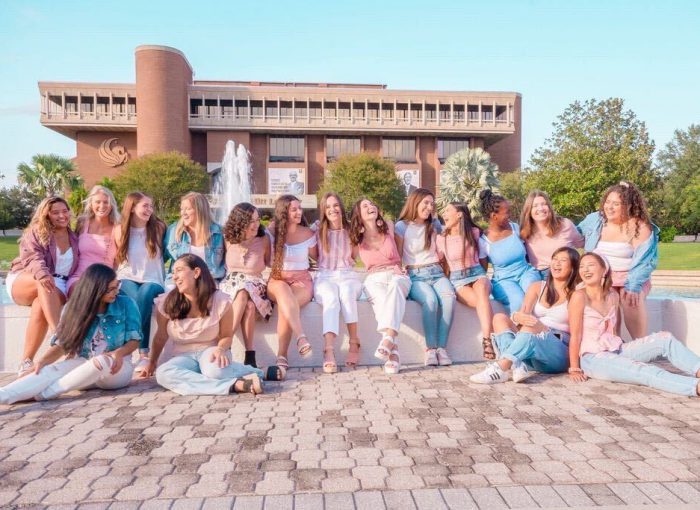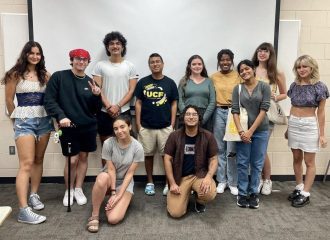By Margo McCoy
In the spring semester of my freshman year, I struggled to find new ways to get involved on campus. As an advertising and public relations major, it felt like all of my friends were involved in STEM-based clubs, and I was hoping to find something that would also benefit me professionally and socially. STEM clubs, unfortunately, were not the trick for me. After scrolling through KnightConnect for hours on end, I finally came across an organization — Her Campus at UCF (HCUCF) and began stalking their social media pages.
From the first look, I knew it was a digital magazine, but it seemed very clear that Her Campus also provided opportunities for individuals to get marketing, events, public relations and editing experience. It seemed like the perfect place for me considering I had a passion for writing as well. After looking into the national chapter of the magazine, I found that the publication was started by college women for college women so students could find their voice and speak out about the issues that matter most to them, whatever that may be — politics, mental health or entertainment. Students get the chance to help run different events and assist brand campaigns, work on social media accounts, and write with the hope of becoming published.
However, the most important aspect of Her Campus at UCF is the community it provides for writers. Over time, Her Campus chapters have developed into all-inclusive spaces for those who are underrepresented, including many minority groups and the LGBTQ+ community. With a strong belief in equality, the organization leaves no space for hate among its 120 members. Anyone and everyone can join the organization, regardless of their sexual orientation, gender identity or race. Her Campus aims to provide opportunities like friendship, professional development and a safe space to engage creatively.

Beyond our own UCF campus chapter, the national magazine gives us the resources we need to create a sense of community where we can connect with others. From Facebook groups and chapter partnerships, to national professional development conferences in New York City and Los Angeles, we’ve connected with students from across the United States, all the way to other countries like Brazil.
As a community that often provides support and resilience, now more than ever, we are especially strong. In 2020, we have lived through a pandemic, social justice movements, and an election. We’ve become more than just a group of writers, but rather a support system for each other in a crucial year.
When the pandemic hit, members of Her Campus at UCF joined together for virtual socials and meetings, having a place to reach out if they were feeling the effects of quarantining. These meetings and virtual events served as a way for many of us to connect during a time when we were forced into avoiding others and lacked the social interaction we all craved. Professional development workshops were made to help everyone continue to gain new skills and improve their resumes despite feeling like all hope was lost for new opportunities. But most importantly, the team came together to push out new content every day, sharing our thoughts and feelings about the pandemic and creating articles that others across campus could connect with.
Ashley Arenal, president of Her Campus at UCF, said that staying virtually connected with the group has helped her immensely during the pandemic. “There’s always someone in the organization that’s available to talk, and it’s so nice to know that I’m not alone even if I’m feeling sad or frustrated. Our virtual socials also act as a nice escape from my mundane quarantine routine.”
After the death of George Floyd, members found support by attending protests together, sharing safety tips on staying safe during the protests, and exchanging resources such as petitions to sign and organizations to donate to. By writing about and actively covering the movement, Her Campus writers found a way to make an impact and share information with other college students who might have been unaware of this advocacy for change. Likewise, minority groups within the organization found a place where they could share their experiences with the rest of UCF.
During the presidential election, members never hesitated to provide information, help, and support to other writers. Staff sent out words of encouragement during especially hard moments, used their own time to research voting resources for others, and were always available to share their advice for getting through this election season. From reminders to register to vote to members going out and voting together, the community only grew stronger. Marginalized groups were able to share about their first time voting and express their fears for the election. And when election night came, members had a space to share their thoughts and opinions during the stress of the evening and receive support from others.
The organization even took it upon themselves to use their social media platforms for advocacy. By sharing articles written by the team on topics such as political advocacy tips, election updates, and personal voting narratives, Her Campus amplified the voices of UCF students to an audience of over 10,000 followers. Through platforms such as Instagram and its story feature, HCUCF shared posts by other publications, politicians, and activists about advocacy resources, educational resources for Black Lives Matter and the election, and safety tips for the pandemic. The organization opened their arms to help educate the UCF community and encourage others to stay safe during difficult times.
Samantha Olson, deputy editor of HCUCF, and Rose Balicki, HCUCF’s senior editor, spoke out on their experiences in the organization, and the benefits that they’ve felt during their time in the group. “Her Campus has been an incredible support system for me throughout my entire college career. The organization itself is rooted in intersectional feminism and I’ve constantly been surrounded by likeminded individuals who have believed in me from day one,” said Olson. “My favorite thing about Her Campus is that I know anyone who’s part of the organization would mention my name in a room full of opportunities — and that’s what it’s all about.”
Balicki also spoke on the organization’s potential for creative freedom: “Her Campus has not only helped me to become a stronger writer but to find my voice writing about topics I care about and ones I wouldn’t have had the chance to write about otherwise. It’s a place where everyone, no matter their background, can find their place and their people.”

Just two years after joining Her Campus, I’m about to graduate. Most of my friends were made through this organization, people I would have never met without joining. My perspective of the world has changed greatly — I’ve been introduced to issues I didn’t know much about previously but am now passionate about. I’ve learned to speak out on what matters most to me and not be afraid to let my voice or my writing be heard. This organization has impacted me, and others, in more ways than just by improving our writing skills. On the surface, we might be viewed as a magazine, but beneath that, we are so much more — we’ve become a family.




